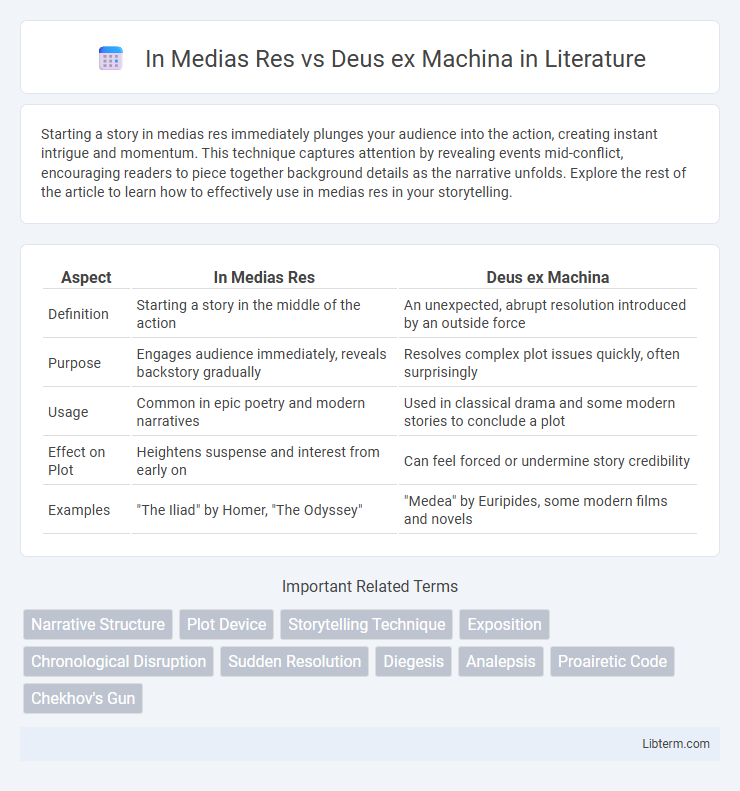Starting a story in medias res immediately plunges your audience into the action, creating instant intrigue and momentum. This technique captures attention by revealing events mid-conflict, encouraging readers to piece together background details as the narrative unfolds. Explore the rest of the article to learn how to effectively use in medias res in your storytelling.
Table of Comparison
| Aspect | In Medias Res | Deus ex Machina |
|---|---|---|
| Definition | Starting a story in the middle of the action | An unexpected, abrupt resolution introduced by an outside force |
| Purpose | Engages audience immediately, reveals backstory gradually | Resolves complex plot issues quickly, often surprisingly |
| Usage | Common in epic poetry and modern narratives | Used in classical drama and some modern stories to conclude a plot |
| Effect on Plot | Heightens suspense and interest from early on | Can feel forced or undermine story credibility |
| Examples | "The Iliad" by Homer, "The Odyssey" | "Medea" by Euripides, some modern films and novels |
Understanding In Medias Res
In Medias Res refers to a narrative technique where a story begins in the middle of the action, immersing the audience directly into critical events without extensive background exposition. This method enhances engagement by creating immediate tension and curiosity, prompting viewers or readers to piece together prior events through dialogue or flashbacks. Unlike Deus ex Machina, which introduces unexpected resolutions, In Medias Res relies on unfolding existing conflicts organically within the plot.
Defining Deus ex Machina
Deus ex Machina is a narrative device where an unexpected power or event resolves a seemingly unsolvable problem, often introduced abruptly without prior foreshadowing in the plot. This plot mechanism derives from ancient Greek theater, where a god was mechanically lowered onto the stage to untangle complex storylines. Unlike In Medias Res, which begins a story amid action, Deus ex Machina interrupts the narrative flow to deliver an unforeseen resolution, sometimes criticized for undermining plot coherence.
Origins and Historical Contexts
In medias res, originating from ancient Greek epic poetry like Homer's Iliad, immerses audiences directly into the middle of the narrative, enhancing engagement by bypassing preliminary exposition. Deus ex machina, rooted in classical Greek theater, specifically refers to the theatrical device involving a machine to lower gods onto the stage, resolving complex plots unexpectedly and often controversially. Both devices reflect ancient storytelling traditions but serve contrasting functions: in medias res emphasizes narrative immersion while deus ex machina provides abrupt, external resolution.
Narrative Impact of In Medias Res
In medias res injects immediate tension by beginning a story amid crucial events, immersing the audience without prior exposition. This technique enhances narrative momentum and engagement by compelling readers to piece together backstory through context and character interactions. The resulting dynamic storytelling fosters deeper emotional investment and a vivid sense of urgency compared to the abrupt resolution often associated with deus ex machina.
Narrative Consequences of Deus ex Machina
Deus ex Machina often results in narrative dissatisfaction by resolving complex plot conflicts through unexpected, external intervention rather than organic story development, undermining character agency and plot coherence. This abrupt resolution can diminish emotional investment and reduce the story's thematic resonance, causing audiences to perceive the narrative as contrived or lazy. In contrast to In Medias Res, which immerses the audience in dynamic action and encourages active engagement, Deus ex Machina frequently disrupts narrative flow and weakens overall story impact.
Reader Engagement: Which Technique Wins?
In Medias Res captivates readers by plunging them directly into the action, fostering immediate curiosity and active interpretation to fill in backstory gaps, thus maintaining high engagement throughout the narrative. Deus ex Machina, while resolving conflicts abruptly, often disrupts narrative flow and diminishes reader investment by undermining established plot logic, resulting in reduced emotional payoff. Therefore, In Medias Res typically wins in reader engagement by sustaining suspense and immersive storytelling from the outset.
Storytelling Examples in Literature
In medias res begins narratives by plunging readers directly into the action, exemplified by Homer's *The Iliad*, which starts amid the Trojan War, immersing audiences without prior exposition. Deus ex machina resolves complex plot conflicts through unexpected interventions, as seen in Euripides' *Medea*, where the goddess Helios provides Medea an escape chariot, abruptly resolving tension. Both techniques uniquely shape narrative structure, with in medias res intensifying engagement through immediate conflict and deus ex machina rapidly concluding stories through external, often divine, interference.
In Medias Res vs Deus ex Machina in Film
In film, In Medias Res begins the story in the middle of action, engaging viewers immediately by dropping them into a crucial moment, which enhances narrative immersion and pacing. Deus ex Machina, by contrast, introduces an unexpected, often implausible resolution to conflicts, which can undermine story coherence and character development. Effective films use In Medias Res to build suspense and maintain audience interest, while overreliance on Deus ex Machina risks alienating viewers with perceived narrative shortcuts.
How to Choose the Right Narrative Device
Choosing between In Medias Res and Deus ex Machina depends on the story's structure and desired audience impact. In Medias Res immerses readers by starting the narrative amid action, creating immediate engagement and suspense through active plot development. Deus ex Machina resolves complex conflicts unexpectedly, which can provide quick closure but risks undermining narrative credibility if overused or poorly integrated.
The Future of Narrative Openings and Resolutions
In medias res offers immersive narrative openings by plunging audiences directly into the action, fostering immediate engagement and emotional investment. Deus ex machina resolutions can undermine story credibility by introducing unexpected, often arbitrary solutions, while evolving storytelling trends favor coherent, character-driven conclusions that enhance narrative satisfaction. Writers and creators increasingly blend these techniques to craft dynamic openings and authentic resolutions that resonate with contemporary audiences and future narrative demands.
In Medias Res Infographic

 libterm.com
libterm.com